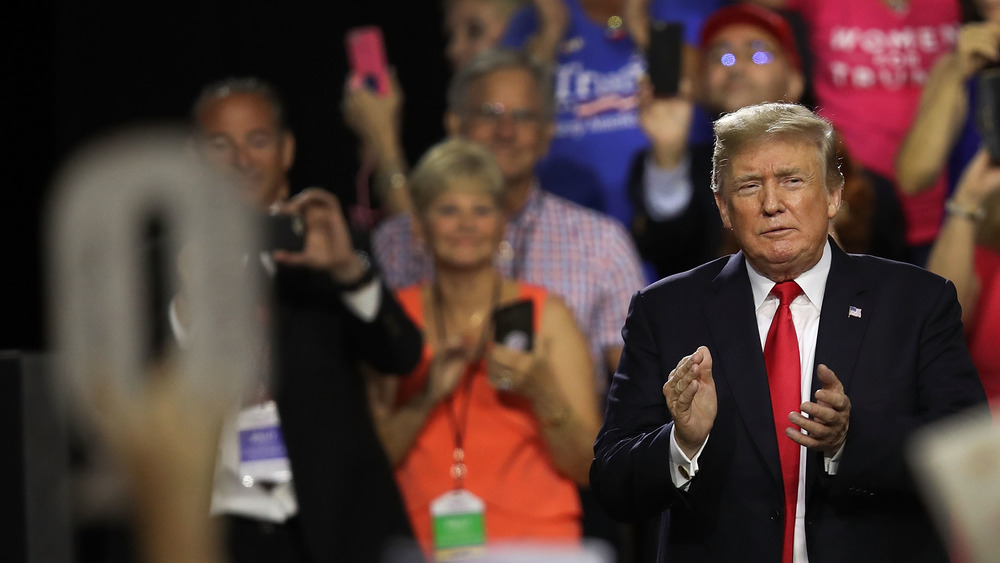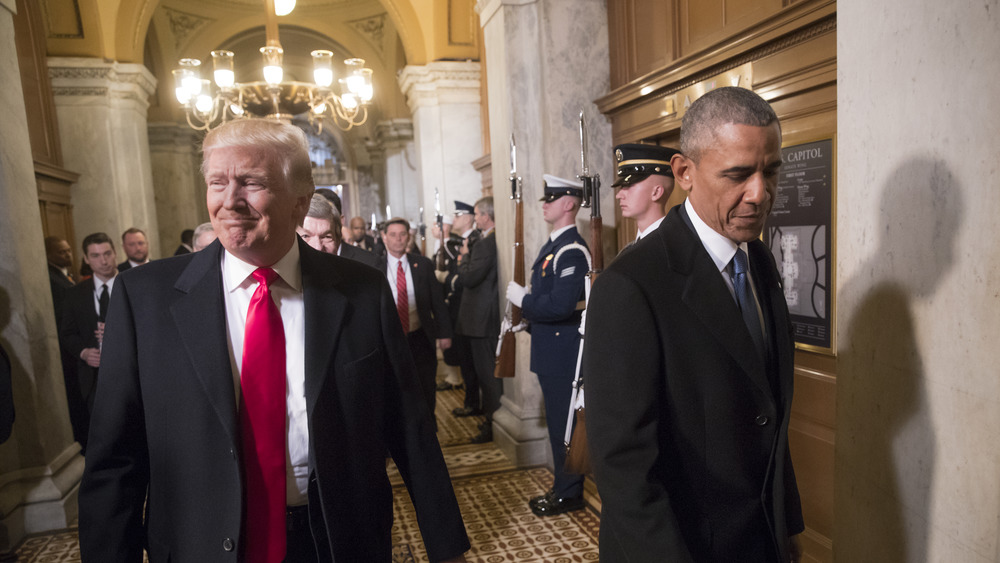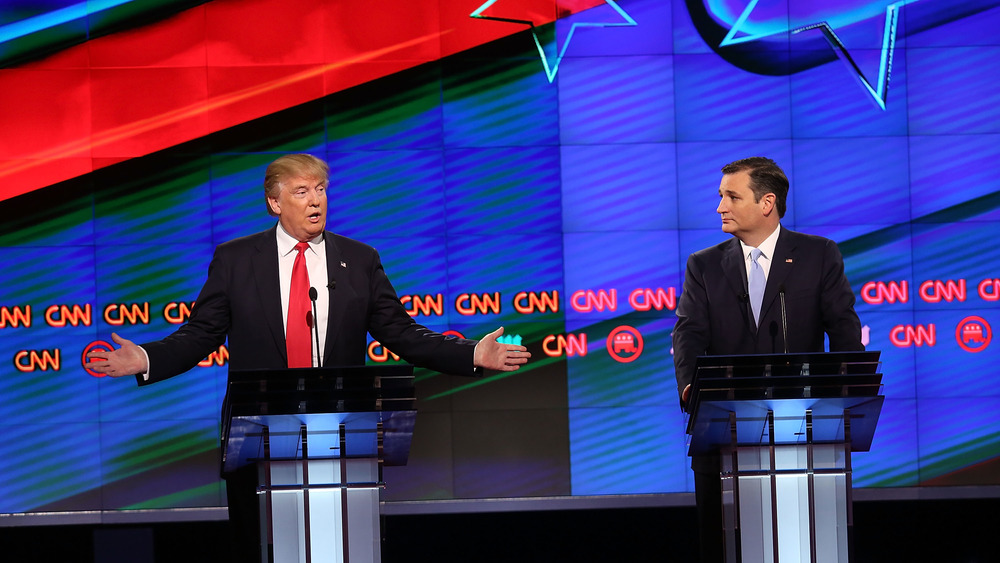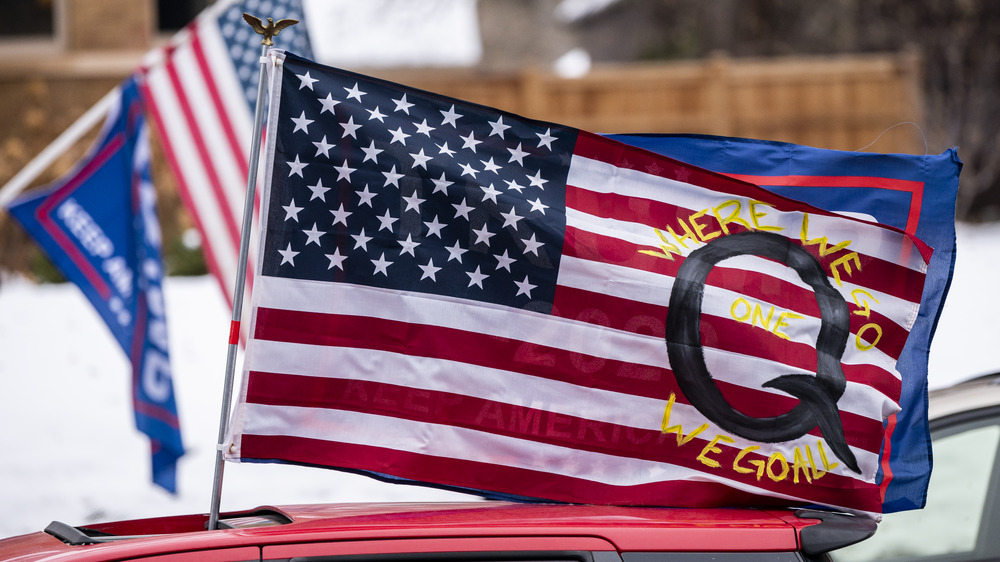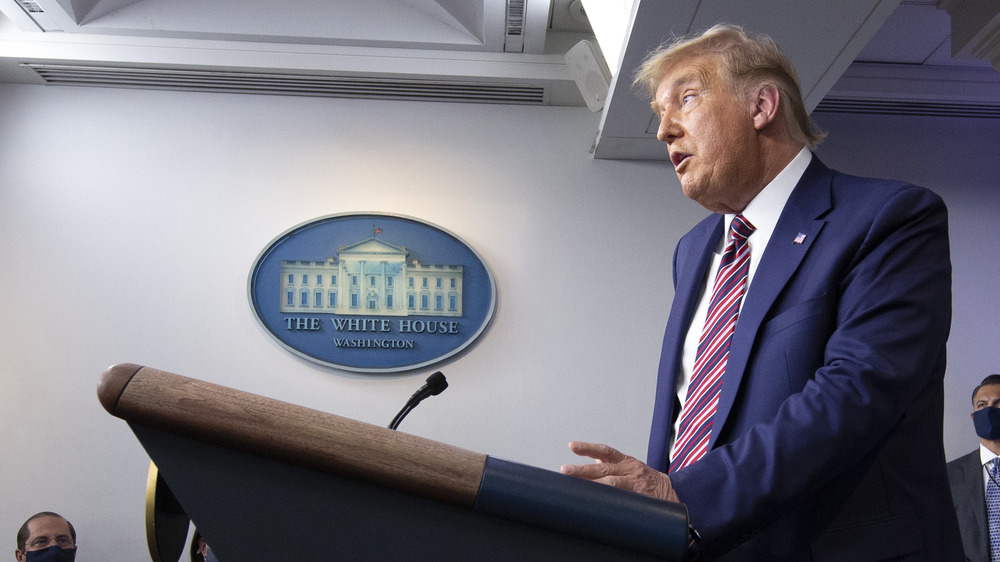These Are The Conspiracy Theories That Donald Trump Is Into
What connects the insane conspiracy theories that President Donald Trump has helped to circulate, even before he was running for office? The commonality is that the spreading of each one works, in some way, to his benefit. Trump's now-notorious engagement with fringe, unproven, and demonstrably false ideas hasn't come about because the President himself has a preference for the tin foil hat; rather, he understands that such falsehoods can help steer the narrative of his presidency and work to delegitimize his political opponents. As an article in the Atlantic, titled "Trump Needs Conspiracy Theories" argues: The president uses them for political and personal ends. "The damage he's wrought along the way won't be easily repaired." Meanwhile, the New Yorker has claimed that America is in the midst of a "conspiracy theory crisis," and that "the Trump Presidency has taken us down the rabbit hole."
Throughout Trump's comparatively short political career, the businessman and former reality TV star has repeatedly evoked divisive and scurrilous ideas and allowed them to embed themselves into American public discourse, giving such conspiracy theories an extended half-life that they wouldn't have achieved without the oxygen of his speeches, press briefings, and late-night tweets. In 2019, Business Insider listed 24 conspiracy theories that Trump had publicly circulated, a number which has increased since. Here are just a handful of the most egregious.
Donald Trump and Birtherism
Back in 2011, when he was hinting at another run at the White House, according to ABC News, Donald Trump began perpetuating a conspiracy theory which was essentially a campaign of hate against the then-current President, Barack Obama. The theory was simple: that Obama, the first Black President of the United States, was never eligible to hold a seat in high office as, secretly, he had not been born in the United States.
"Why doesn't he show his birth certificate? There's something on that birth certificate that he doesn't like," Trump reportedly told The View that March. But of course, when Obama went ahead and publicly published his birth certificate the following month, Trump still didn't consider the matter settled. He continued to insist that Obama had been born in Kenya before being raised in Indonesia and Hawaii, tweeting: "An 'extremely credible source' has called my office and told me that @BarackObama's birth certificate is a fraud."
Trump's false claims helped to align him with the portion of the American population who weren't entirely happy living through the country's first Black Presidency. Trump only ever conceded Obama's American citizenship once he himself had won the 2016 election.
"Birtherism," as it came to be known, eventually died down. In 2020, however, Trump attempted to propel a parallel theory into the limelight, according to the BBC, making a similar claim about Joe Biden's running mate, Kamala Harris, the US's first Black Vice-President-elect.
Ted Cruz's father and the JFK assassination
No other phrase gets the American psyche whirring quite like "the assassination of JFK." Its very power over our collective consciousness may have been what Donald Trump was playing upon when he summoned the tragic events of November 22, 1963 in his attacks upon fellow Republican presidential candidate Ted Cruz back in 2016, smearing his opponent with the bizarre claim that Cruz's father was somehow involved in the killing.
"His father was with Lee Harvey Oswald before Oswald's being — you know, shot. I mean, the whole thing is ridiculous," Trump told Fox News (posted on YouTube). "What is this, right prior to his being shot, and nobody even brings it up. I mean, they don't even talk about that. That was reported, and nobody talks about it."
Business Insider reported that Cruz "exploded" in response to Trump's claims. "This man is a pathological liar. He doesn't know the difference between truth and lies," Cruz said. "Yes, my dad killed JFK. He's secretly Elvis. And Jimmy Hoffa is buried in his backyard." The story Trump was circulating originated in the National Enquirer but was dismissed by Cruz's team as "trash," according to the Miami Herald.
Pizzagate and QAnon
Back in 2016, Trump willingly promoted a falsehood that was first propagated on the fringes of the internet, according to Vox. The conspiracy theory, which came to be known as "pizzagate," claimed his opponent in the Presidential race, Hillary Clinton, was secretly involved in an elite network of child abusers and sex traffickers, or, as The Guardian puts it, that "Hillary Clinton was operating a pedophilia ring out of a gimmicky Washington DC pizza parlor called Comet Ping Pong."
The root of the theory lies in the belief that references to "pizza" in communications within the Clinton campaign team were code for something far darker. There is no evidence for these claims, but they served to smear Trump's opponent and help the former reality TV star clinch the Presidency. The theory didn't disappear once Trump took office, however; rather, it transformed into "QAnon," a belief system in which followers cryptically decode Trump's speeches and behavior to suggest that he is fighting a "shadow war" against the "deep state," made up of a cabal of satanic-cannibalist pedophiles — a narrative Trump has refused to dispel.
As recently as October 2020, Trump was continuing to weaponize such ideas against his enemies, with NBC reporting on the "campaign to 'pizzagate' Hunter Biden."
Donald Trump and the 'stolen' election
Ultimately, Donald Trump lost the 2020 Presidential Election to the Democratic nominee Joe Biden, failing to capitalize on the electoral advantage typically held by incumbents in search of a second term. Then again, there hasn't been much that can be described as typical about the last four years, and Trump's response to losing the vote was predictably unconventional.
"They are trying to STEAL the election," Trump tweeted, as it became obvious that results were not going to go his way, and as The Guardian reports, the response of the Trump campaign thereafter was to file a battalion of legal challenges to the election results as they rolled in. The Trump team claimed mass voter fraud, though at the time of this writing no evidence has been provided to support such claims. Trump's response to the election result came as no surprise to political pundits, however, with the BBC reporting that the idea of voter fraud has "deep roots."
"Research by the BBC's Anti-disinformation unit reveals that disinformation about voter fraud has been plugged by influential accounts on social media repeatedly, for months," the broadcaster claims.
Many of Trump's allies have subsequently distanced themselves from the outgoing President and his voter fraud campaign. However, one old adversary has unexpectedly supported the President's unsubstantiated claims of vote tampering: Ted Cruz. Time heals all wounds, as they say.
